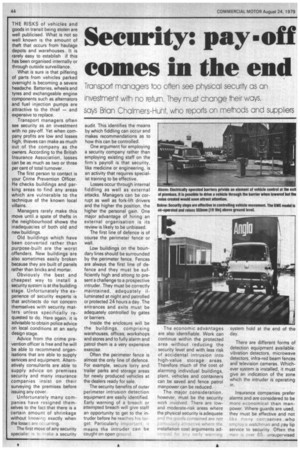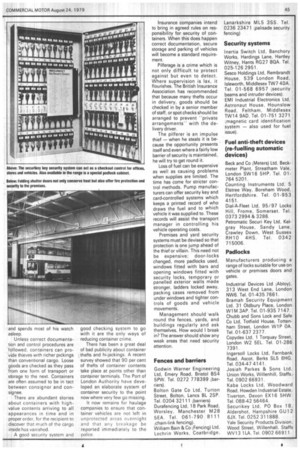Security: pay -off comes in the end
Page 46

Page 47

If you've noticed an error in this article please click here to report it so we can fix it.
Transport managers too often see physical securi-y as an investment with no return. They must change eir ways, says Brian Chalmers-Hunt, who reports on me ods anc suppliers
THE RISKS of vehicles and goods in transit being stolen are well publicised. What is not so well known is the amount of theft that occurs from haulage depots and warehouses. It is rarely easy to establish if this has been organised internally or through outside surveillance.
What is sure is that pilfering of parts from vehicles parked overnight is becoming a severe headache. Batteries, wheels and tyres and exchangeable engine components such as alternators and fuel injection pumps are attractive to the thief — and expensive to replace.
Transport managers often see security as an investment with no pay-off. Yet when company profits are low and losses high, thieves can make as much out of the company as the owners. According to the British Insurance Association, losses can be as much as two or three per cent of total turnover.
The first person to contact is your Crime Prevention Officer. He checks buildings and parking areas to find any areas which are vulnerable to the technique of the known local villains.
Managers rarely make this move until a spate of thefts in the neighbourhood shows the inadequacies of both old and new buildings.
Old buildings which have been converted rather than purpose-built are the worst offenders. New buildings are also sometimes easily broken because they are built of panels rather than bricks and mortar.
Obviously the best and cheapest way to install a security system is at the building stage. Unfortunately the experience of security experts is that architects do not concern themselves with security mat _ .. ters unless specifically re quested to do. Here again, it is advisable to obtain police advice on local conditions at an early design stage.
Advice from the crime prevention officer is free and he will be able to recommend organisations that are able to supply services and equipment. Alternatively consultants are able to supply advice on premises security and many insurance companies insist on their surveying the premises before issuing any cover.
Unfortunately many companies have resigned themselves to the fact that there is a certain amount of shrinkage without knowiry exactly when the lossu: are oc. Jrring.
The first move of any security special's is t make a security
audit. This identifies the means by which fiddling can occur and makes recommendations as to how this can be controlled.
One argument for employing a security company rather than employing existing staff on the firm's payroll is that security, like medicine or engineering, is an activity that requires specialist training to be effective.
Losses occur through internal fiddling as well as external attacks. Managers can be corrupt as well as fork-lift drivers and the higher the position, the higher the personal gain. One major advantage of hiring an external organisation is its review is likely to be unbiased.
The first line of defence is of course the perimeter fence or wall.
Low buildings on the boundary lines should be surrounded by the perimeter fence. Fences are always the first line of defence and they must be sufficiently high and strong to present a challenge to a prospective intruder. They must be correctly maintained, adequately illuminated at night and patrolled or protected 24 hours a day. The entrances and exits must be adequately controlled by gates or barriers.
Inside the enclosure will be the buildings, comprising warehouses, offices, workshops and stores and to fully alarm and patrol them is a very expensive exercise.
Often the perimeter fence is almost the only line of defence. For example, secure lorry and trailer parks and storage areas for newly produced vehicles at the dealers ready for sale.
The security benefits of outer perimeter intrusion detection equipment are easily identified. Early warning of a breach or attempted breach will give staff an opportunity to get to the intruder before he reaches his target Particularly important, it means the intruder can be caught on open ground The economic advantages are also identifiable. Work can continue within the protected area without reducing the security level and with less risk of accidental intrusion into high-value storage areas. Therefore much of the cost of alarming individual buildings, plant, vehicles and containers can be saved and fence patrol manpower can be reduced.
The major consideration, however, Must be the security work involved. There are lowand moderate-risk areas where the physical security is adequate and the goods contained are not 1„:,rticularly attractive where the installation cost arguments ad
foT any early warn rig system hold at the end of the day.
There are different forms of detection equipment available: vibration detectors, microwave detectors, infra-red beam fences and television cameras. Whichever system is installed, it must give an indication of the zone which the intruder is operating in.
Insurance companies prefer alarms and are considered to be more economical than manpower. Where guards are used, they must be ,effective and not like many companies who employ a vvatchr.an and pay lip service to security. Often the mar c.ver 65, unsupervised
and spends most of his watch asleep.
Unless correct documentation and control procedures are followed, containers can provide thieves with richer pickings than conventional cargo. Loose goods are checked as they pass from one form of transport or storage to the next. Containers are often assumed to be in tact between consignor and consignee.
There are abundant stories about containers with highvalue contents arriving to all appearances in time and in proper order, for the recipient to discover that much of the cargo inside has vanished, A good security system and good checking system to go with it are the only ways of reducing container crime.
There has been a great deal of bad publicity about container thefts and hi-jackings. A recent survey showed that 90 per cent of thefts of container contents take place at points other than container terminals_ The Port of London Authority have developed an elaborate system of container security to the point now where very few go missing.
It now remains for haulage companies to ensure that container vehicles are not left in unprotected areas mernight and that any breakage be reported immediately to the police. Insurance companies intend to bring in agreed rules on res ponsibility for security of con tainers. When this does happen correct documentation, secure storage and parking of vehicles will become a standard requirement.
Pilferage is a crime which is not only difficult to protect against but even to detect.
Where supervision is lax, it flourishes. The British Insurance Association has recommended that because many thefts occur in delivery, goods should be checked in by a senior member of staff, or spot checks should be arranged to prevent "'private arrangements"' with the delivery driver.
The pilferer is an impulse thief — when he steals it is be cause the opportunity presents itself and even where a fairly low barrier of security is maintained, he will try to get round it.
Loss of fuel can be expensive as well as causing problems when supplies are limited. The time has come for stricter control methods. Pump manufac turers can offer security key and card-controlled systems which keeps a printed record of who draws the fuel and to which vehicle it was supplied to. These records will assist the transport manager in controlling his vehicle operating costs.
Premises and yard security systems must be devised so that protection is one jump ahead of the thief or villain. This need not be expensive: door-locks changed, more padlocks used, windows fitted with bars and opening windows fitted with security locks, temporary or panelled exterior walls made stronger, ladders locked away, packing cases removed from under windows and tighter controls of goods and vehicle movements.
Management should walk round the fences, yards, and buildings regularly and ask themselves, How would I break in? The answer should show any weak areas that need security attention.
Fences and barriers Godwin Warner Engineering Ltd, Emery Road, Bristol 8S4 5PW. Tel. 0272 778399 ,,barriers).
Bolton Gate Co Ltd, Turton Street, Bolton, Lancs BL 2SP. Tel. 0204 32111 ;barriers) Durafencing Ltd, 18 Park Road, VVorsley, Manchester M28 5EA. Tel. 061-790 8111 ;chain-link fencing).
William Bain & Co ;Fencing) Ltd, Lochrin Works, Coatbridge, Lanarkshire ML5 3SS. Tel. 0236 23471 ,palisade security fencing)
Security systems
Inertia Switch Ltd, Banchory Works, Hardings Lane, Hartley Witney, Hants RG27 80A. Tel. 025-126 2951.
Sesco Holdings Ltd, Rembrandt House, 539 London Road, Isleworth, Middlesex TW7 4DA. Tel. 01-568 6957 ;security beams and intruder devices). EMI industrial Electronics Ltd, Astronaut House, Hounslow Road, Feltham, Middlesex TW14 9AD. Tel. 01-751 3271 magnetic card identification system — also used for fuel issue).
Fuel anti-theft devices (re-fuelling automatic devices)
Beck and Co ,Meters) Ltd, Beckmeter Plant, Streatham Vale, London SW16 5HP. Tel. 01764 5201.
Counting Instruments Ltd, 5 Elstree Way, .Boreham Wood, Hertfordshire. Tel. 01-953 4151.
Dial-A-Fleet Ltd, 95/97 Locks Hill, Frome, Somerset. Tel, 0373 2994 & 3286.
Petromatic Securi Key Ltd, Kelgray House, Sandy Lane, Crawley Down, West Sussex RH10 4HS, Tel. 0342 715006.
Padlocks
Manufacturers producing a range of locks suitable for use on vehicle or premises doors and gates.
Industrial Devices Ltd Abloy). 313 West End Lane, London NW6. Tel. 01-4357661. Bramah Security Equipment Ltd, 31 Oldbury Place, London W1M 3AP. Tel. 01-935 7147. Chubb and Sons Lock and Safe Co Ltd, Totfield House, Tottenham Street, London VV1P OA. Tel. 01-637 2377.
Copydex Ltd, 1 Torquay Street, London W2 5EL. Tel. 01-286 7391.
Ingersoll Locks Ltd, Farnbank Road, Ascot, Berks SL5 8HG. Tel 034-47 4141.
Josiah Parkes & Sons Ltd, Union Works, Willenhill, Staffs.. Tel. 0902 66931.
Kaba Locks Ltd, Woodward Road, Howden Industrial Estate, Tiverton, Devon EX16 5HW, Tel. 088-42 56464.
Securikey Ltd, PO Box 18, Aldershot, Hampshire GU 12 6JX. Tel. 0252 311888.
Yale Security Products Division, Wood Street, VVillenhall, Staffs VVV13 1 LA. Tel, 090266911.








































































































